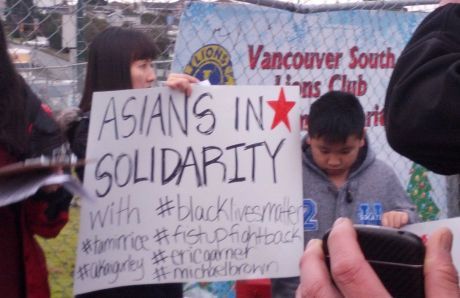Reports
You are here
Justice for Phuong Na Du

December 22, 2014
Yesterady about 100 people attended a vigil at the corner of 41st and Knight to mark the place where Phuong Na (Tony) Du was gunned down by Vancouver police on November 22.
The incident brings to light once again police violence against racialized communities and people with mental health issues. Organizers spoke in solidarity with marginalized communities across the globe, and especially the Black community in the US that has mobilized against the police killing of Michael Brown, Eric Garner, and others.
Survived imperialist war, killed by police
Du, 51, was known to friends and family as a gentle, kind and caring person. As one speaker noted, if you could use one word to describe Du it would be “happy”—which is perhaps surprising given the hardship he suffered growing up in rural Vietnam and then being forced from his homeland by an imperialist war. Du had schizophrenia and lost his job as a janitor, but despite not having much he was the kind of person who would gladly share what he had and he always tried hard to take care of his mother.
Witnesses who saw the shooting described him as being distraught, talking to himself and yelling while he dragged a 2x4 along a fence. But witnesses did not report feeling threatened by his behavior or seeing him threaten anyone.
Many at the vigil were angry that police made no attempt to bring someone to the scene who could communicate with Du in his native Vietnamese, or bring anyone with expertise in dealing with mental health crises. One witness said that police shot Phuong, who later died in hospital, less than a minute after arriving on the scene. As one attendee noted this was eerily similar to the murder of twelve year old Tamir Rice by Cleveland police last month only moments after arriving on the scene where the boy was holding a bee bee gun.
At the vigil one woman described how she heard the shots as she was driving through the intersection. “I assumed he had a gun or that they were using rubber bullets. I’ve never seen this kind of violence in the 20 I’ve lived here. It was horrific; and all because he was holding a piece of wood.”
Racism and psychiatric oppression
The murder of Phuong Na Du shows that little has changed since the 2007 RCMP death by tasing of Polish immigrant Robert Dziekanski at the Vancouver airport. Despite the purchase of high tech weapons and toys by Vancouver police during the Olympics in 2008, no resources have been directed towards hiring or training specialists to deal with those with mental health issues who police come in contact with on a daily basis—despite recommendations from mental health experts. There is also racist discrimination against immigrants who suffer higher levels of psychological distress than non-immigrants because of racism, language barriers, dislocation and in the case of refugees often PTSD due to the experiences which drove them from their home countries.
This double oppression means police violence disproportionately targets racialized people with mental health issues, including Michael Eligon (who police shot to deah outside a Toronto hospital in 2012), Sammy Yatim (who police shot to death then tazed on a Toronto streetcare last year), and Phuong Na Du this year.
No justice, no peace
Phuong Na Du’s death is currently being investigated by the Independent Investigations Office, which is supposed to provide civilian oversight in cases of serious police incidents. Vigil organizers raised serious doubts about the legitimacy of the IIO where at least half of investigators are former police officers. Just 3 per cent of cases referred to IIO result in charges against the officers.
If any justice is to be had we will have to continue to speak out and put public pressure on the IIO and crown counsel to lay charges in the incident and call for major changes in how police treat immigrants and people with mental health issues.
Section:









